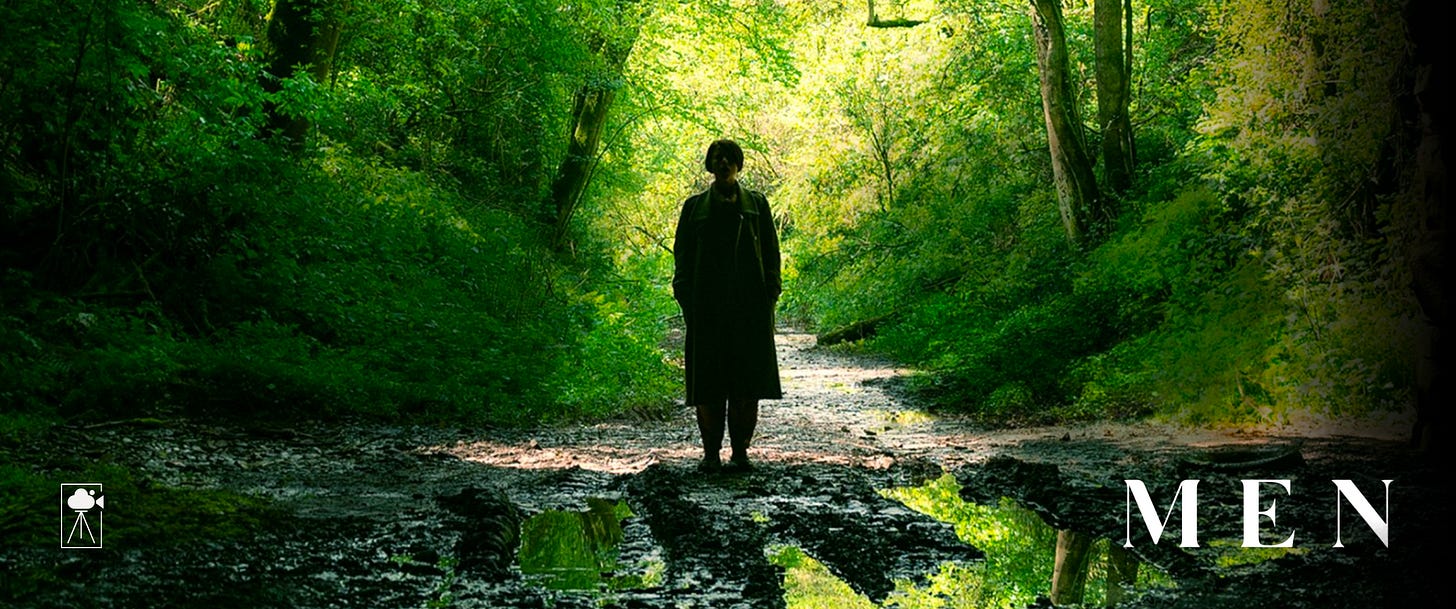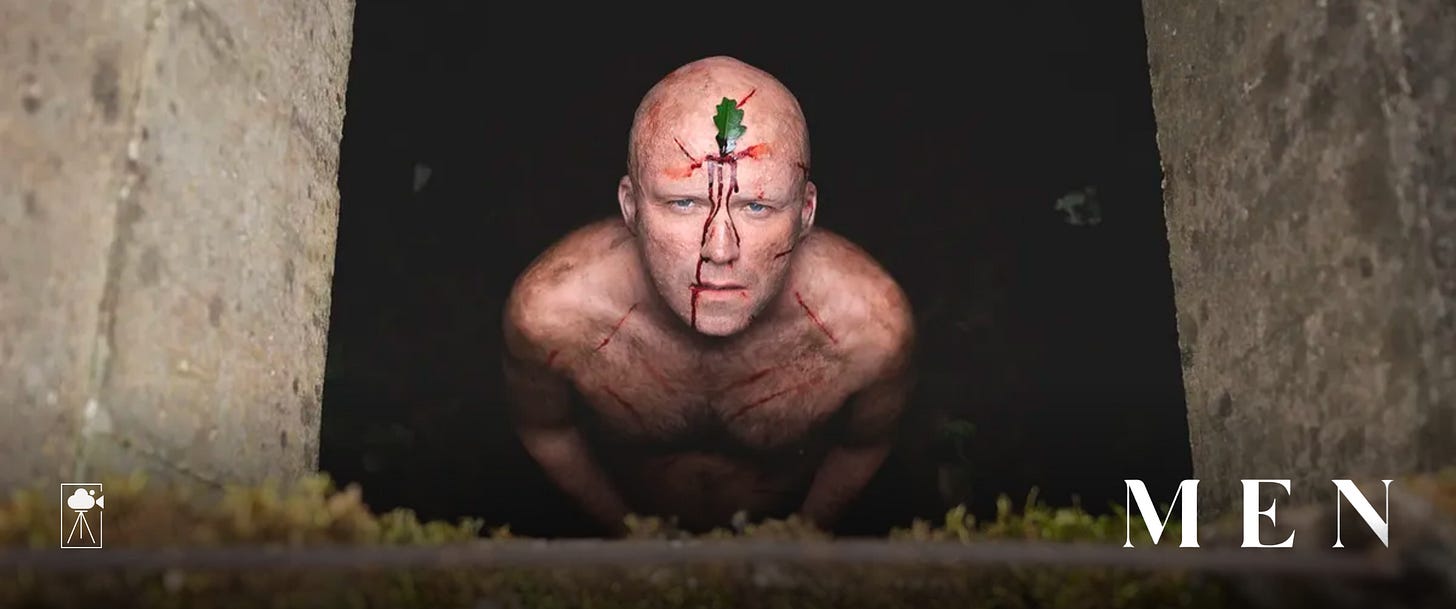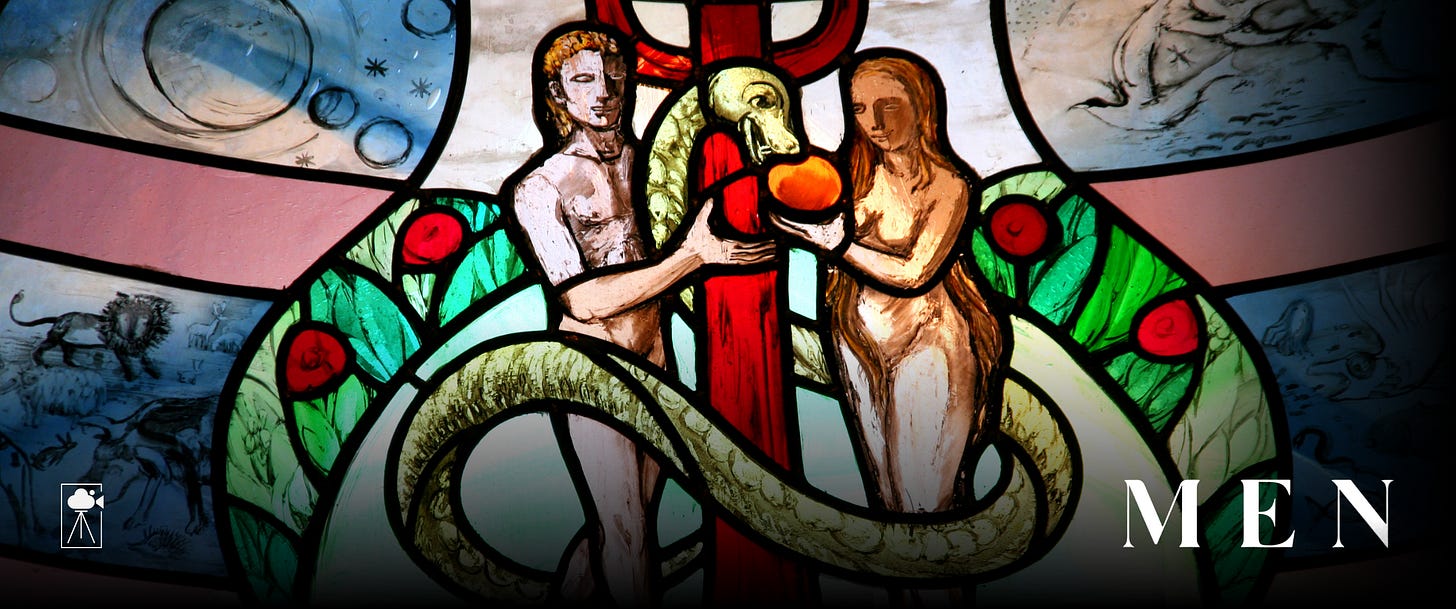"Men" and Original Sin
Alex Garland's latest film is uneven, but left me thinking for days.
Geoffrey: [points to the half-eaten apple] Apple from the garden?
Harper: Yeah, it was delicious.
Geoffrey: No, no, no, no. Mustn't do that. Forbidden fruit.
I have mixed thoughts on Alex Garland’s newest film, Men. On the one hand, I left the theater unsatisfied. The plot was thin and half-baked, the film’s message seemed incredibly straightforward and shallow, and despite Garland’s incredible knack for visual storytelling, it all just felt uninteresting.
On the other hand, I’ve found myself continually thinking back to the film since I watched it. I still have my problems with the film (and my personal distaste for body horror made me feel squeamish by the end), but any movie that I can’t stop thinking about must at least have some merit. Garland didn’t spend enough time developing his own themes, but what he provided viewers gave me enough to think on, particularly what he has to say about the cyclical nature of sin. Needless to say, spoilers ahead…
In the aftermath of a personal tragedy, Harper retreats alone to the beautiful English countryside, hoping to have found a place to heal. But someone or something from the surrounding woods appears to be stalking her. What begins as simmering dread becomes a fully-formed nightmare, inhabited by her darkest memories and fears (A24).
A Slow Burn
For the first two acts, Men’s sole purpose seems to be showing the audience the unease that women feel in nearly all interactions with men. Whether it’s an old house caretaker, a young boy, a vicar, a bartender, or a policeman, we see all the men in this film through Harper’s eyes. Which is to say, we see them and fear them.
No matter the man, all of Harper’s interactions with men eventually devolve into tension. The caretaker’s awkward jokes and glances are uncomfortable. The vicar blames her for her husband’s suicide. A boy harshly commands Harper to play with him. A policeman doesn’t believe that Harper is being stalked (which she is).
Scariest of all - all of the men in the film are played by the same actor, Rory Kinnear. This adds to our unease in these situations. We don’t trust these men because deep down, we can literally see that all men are the same. And of course that’s the metaphor we’re supposed to take from all of this - regardless of age or occupation, most men are the same deep down. And those deep, shared similarities justifiably scare Harper.
Let’s Talk About THAT Ending
The third act of Men (like all Alex Garland films) descends into absolute chaos. After a home invasion, Harper tries to escape the house she’s been vacationing at, only to crash her car at the entrance and encounter her stalker. In what seems to be a never-ending scene, the stalker collapses and literally gives birth to the young boy we saw earlier in the film. The boy then gives birth to the vicar, who gives birth to Geoffrey, and so on, until eventually all male characters have given birth to the others.
Like I said…not for the faint of heart, and not my cup of tea either.
But the imagery and metaphors are ripe here. We already have been shown that “all men are the same” by using the same actor for the male parts. But now we see that not only are men the same, they’re passing along their traits, their qualities, and their problems from generation to generation. They’re giving birth to the same gender problems over and over again.
Original Sin
The ending of Men couldn’t help but remind me of the Christian doctrine of “original sin,” which is likely the reason the film has stuck with me for so long. Original sin is the belief that humans at birth are sinful creatures, because of Adam and Eve’s "original sin.” Psalm 51:5 states, “I was brought forth in iniquity, and in sin did my mother conceive me.” Romans 5 specifically points to Adam as the root of this:
Adam sinned, and that sin brought death into the world. Now everyone has sinned, and so everyone must die…Adam disobeyed God and caused many others to be sinners.
Because Adam and Eve ate from the forbidden fruit (a reference Garland explicitly calls out in Men), all future humanity was doomed to sin. I mentioned in my blog a few weeks ago that everyone after Adam suffered the consequences of Adam’s actions:
I really like the implications of Genesis 5:3, which says: “When Adam had lived one hundred and thirty years, he became the father of a son in his own likeness, according to his image.” Adam’s son was made in Adam’s image, and so he began as a sinful, selfish creation. Even though we all still bear the image of God, since Adam’s sin, we now bear that sinful image as well.
Garland seems to understand this concept and be applying it to Men as well. Men have a history of sexism and abuse that is passed down from generation to generation. Garland’s film shows that the longer those behaviors are socially accepted, they’ll “give birth” to even worse behaviors.
What Is Our Hope?
The concept of “toxic masculinity” has been talked to death in recent years, and Men doesn’t have much new to say on the subject. But unfortunately we do still have a long ways to go to reconcile those toxic traits, and Men offers a glimpse as to why - it’s an endless cycle of sin. But with that in mind, what hope is there for the future?
The good news of the Christian faith is that God offered us that hope:
“Everyone was going to be punished because Adam sinned. But because of the good thing that Christ has done, God accepts us and gives us the gift of life.”
Christ defeated sin, and if we accept Him, we can find life through Him. Whereas Men ends with little hope for the state of mankind, Christ offers us a living hope. Yes, the cycle of sin will always be present as long as we’re in this world. But because of Christ, we’re given God's gift of undeserved grace. And we have a hope for a future in which that sin will be forever gone.





